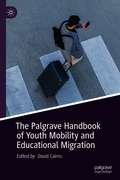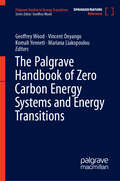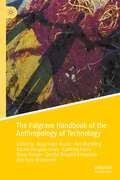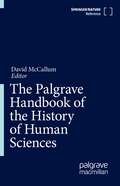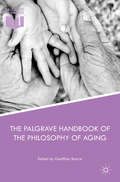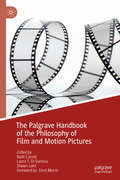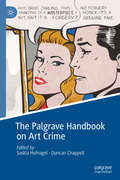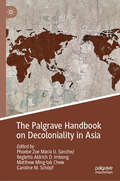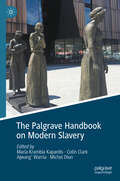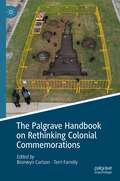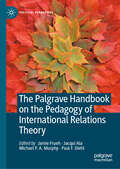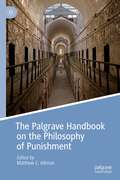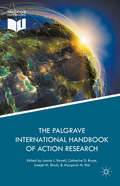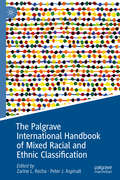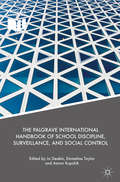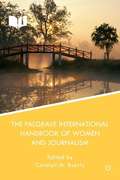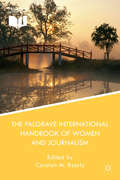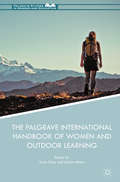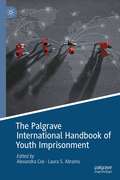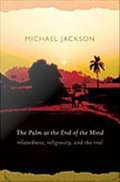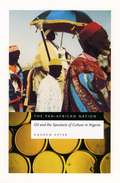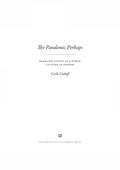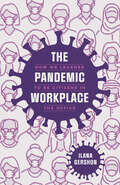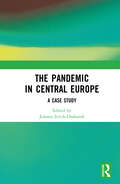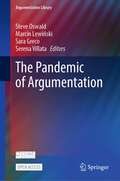- Table View
- List View
The Palgrave Handbook of Youth Mobility and Educational Migration
by David CairnsThis handbook provides an overview of developments in the youth mobility and migration research field, with specific emphasis on movement for education, work and training purposes, encompassing exchanges sponsored by institutions, governments and international agencies, and free movement.The collection features over 30 theoretically and empirically-based discussions of the meaning and key aspects of various forms of mobility as practiced in contemporary societies, and concludes with an exploration of the costs and benefits of moving abroad to individuals and societies at a time when the viability of free circulation is being called into question. The geographical scope of the book covers Europe, Asia, Australia and the Americas, and takes into account socio-economic and regional inequalities, as well as recent developments such as the refugee crisis, Brexit and the Covid-19 pandemic. The book integrates the fields of youth mobility and migration studies, creating opportunities for the establishment of a new paradigm for understanding the spatial circulation of youth and young adults in the twenty-first century.
The Palgrave Handbook of Zero Carbon Energy Systems and Energy Transitions (Palgrave Studies in Energy Transitions)
by Geoffrey Wood Vincent Onyango Komali Yenneti Mariana LiakopoulouThe Palgrave Handbook of Zero-Carbon Energy Systems and Energy Transitions provides a comprehensive and authoritative source of information, analysis and recommendations on the multi- and inter-disciplinary subject of zero carbon energy systems. The Handbook will advance thinking and research underlying the on-going energy transition by; covering a wide range of energy technologies and sources (e.g. fossil fuels, renewables, low carbon energy) including investigating the potential of new and alternative technologies and fuel sources and looking at the power, heating/cooling and transport sectors; Looking at varied legal jurisdictions and governance approaches including developing and developed countries and investigating potential new approaches to achieving a zero carbon energy system; Providing a broad range of theoretical and methodological approaches from a range of disciplines; Inclusion of a global range of case studies from Africa, Arctic, Asia, Australasia, Europe, the Middle East, the Americas (Central, North and South) and the Pacific, from the international, national, sub-national to city/community level.
The Palgrave Handbook of the Anthropology of Technology
by Brit Ross Winthereik Klaus Hoeyer Cathrine Hasse Ayo Wahlberg Dorthe Brogård Kristensen Maja Hojer Bruun Rachel Douglas-JonesThis Handbook offers an overview of the thriving and diverse field of anthropological studies of technology. It features 39 original chapters, each reviewing the state of the art of current research and enlivening the field of study through ethnographic analysis of human-technology interfaces, forms of social organisation, technological practices and/or systems of belief and meaning in different parts of the world. The Handbook is organised around some of the most important characteristics of anthropological studies of technology today: the diverse knowledge practices that technologies involve and on which they depend; the communities, collectives, and categories that emerge around technologies; anthropology’s contribution to proliferating debates on ethics, values, and morality in relation to technology; and infrastructures that highlight how all technologies are embedded in broader political economies and socio-historical processes that shape and often reinforce inequality and discrimination while also generating diversity. All chapters share a commitment to human experiences, embodiments, practices, and materialities in the daily lives of those people and institutions involved in the development, manufacturing, deployment, and/or use of particular technologies.
The Palgrave Handbook of the History of Human Sciences
by David McCallumThe Palgrave Handbook of the History of Human Sciences offers a uniquely comprehensive and global overview of the evolution of ideas, concepts and policies within the human sciences. Drawn from histories of the social and psychological sciences, anthropology, the history and philosophy of science, and the history of ideas, this collection analyses the health and welfare of populations, evidence of the changing nature of our local communities, cities, societies or global movements, and studies the way our humanness or ‘human nature’ undergoes shifts because of broader technological shifts or patterns of living. This Handbook serves as an authoritative reference to a vast source of representative scholarly work in interdisciplinary fields, a means of understanding patterns of social change and the conduct of institutions, as well as the histories of these ‘ways of knowing’ probe the contexts, circumstances and conditions which underpin continuity and change in the way we count, analyse and understand ourselves in our different social worlds. It reflects a critical scholarly interest in both traditional and emerging concerns on the relations between the biological and social sciences, and between these and changes and continuities in societies and conducts, as 21st century research moves into new intellectual and geographic territories, more diverse fields and global problematics.
The Palgrave Handbook of the Philosophy of Aging
by Geoffrey ScarreThis comprehensive handbook presents the major philosophical perspectives on the nature, prospects, problems and social context of age and aging in an era of dramatically increasing life-expectancy. Drawing on the latest research in gerontology, medicine and the social sciences, its twenty-seven chapters examine our intuitions and common sense beliefs about the meaning of aging and explore topics such as the experience and existential character of old age, aging in different philosophical and religious traditions, the place of the elderly in contemporary society and the moral rights and responsibilities of the old. This book provides innovative and leading-edge research that will help to determine the parameters of the philosophy of aging for years to come. Key Features * Structured in four parts addressing the meaning, experience, ethics and future of aging * Comprehensive ethical coverage of the retirement age, health-care for the elderly and the transhumanist life-extending project * Focused treatment of the dementia 'epidemic' and the philosophy of the mind and self The Palgrave Handbook of the Philosophy of Aging is an essential resource for scholars, researchers and advanced students in the philosophy of the self, moral and political philosophy, bioethics, phenomenology, narrative studies and philosophy of economics. It is also a volume of key importance to researchers, advanced students and professionals in gerontology, health care, psychology, sociology and population studies.
The Palgrave Handbook of the Philosophy of Film and Motion Pictures
by Noël Carroll Laura T. Di Summa Shawn LohtThis handbook brings together essays in the philosophy of film and motion pictures from authorities across the spectrum. It boasts contributions from philosophers and film theorists alike, with many essays employing pluralist approaches to this interdisciplinary subject. Core areas treated include film ontology, film structure, psychology, authorship, narrative, and viewer emotion. Emerging areas of interest, including virtual reality, video games, and nonfictional and autobiographical film also have dedicated chapters. Other areas of focus include the film medium’s intersection with contemporary social issues, film’s kinship to other art forms, and the influence of historically seminal schools of thought in the philosophy of film. Of emphasis in many of the essays is the relationship and overlap of analytic and continental perspectives in this subject.
The Palgrave Handbook on Art Crime
by Duncan Chappell Saskia HufnagelThis handbook showcases studies on art theft, fraud and forgeries, cultural heritage offences and related legal and ethical challenges. It has been authored by prominent scholars, practitioners and journalists in the field and includes both overviews of particular art crime issues as well as regional and national case studies. It is one of the first scholarly books in the current art crime literature that can be utilised as an immediate authoritative reference source or teaching tool. It also includes a bibliographic guide to the current literature across interdisciplinary boundaries. Apart from legal, criminological, archeological and historical perspectives on theft, fraud and looting, this volume contains chapters on iconoclasm and graffiti, underwater cultural heritage, the trade in human remains and the trade, theft and forgery of papyri. The book thereby hopes to encourage scholars from a wider variety of disciplines to contribute their valuable knowledge to art crime research.
The Palgrave Handbook on Decoloniality in Asia
by Phoebe Zoe Maria U. Sanchez Regletto Aldrich D. Imbong Matthew Ming-tak Chew Caroline M. SchöpfThis Handbook brings together a plethora of decolonial perspectives from and about Asian countries beyond Southeast Asia. Complementing existing scholarship on decolonisation in Latin America and Africa, emerging and established scholars from the Global North and the Global South cover politically urgent, vital and underexplored topics from the social sciences and humanities. An important compendium, more than 25 original contributions bring debates happening in various parts of the world strongly into conversation with similar debates in the West where there has been little reciprocal exchange. Bringing to the fore the importance of a paradigm shift within academia, this first-of-its-kind Handbook is useful for policy-makers, scholars and students of postcolonial and decolonial studies, sociology, development studies and social movements.
The Palgrave Handbook on Modern Slavery
by Colin Clark Michel Dion Ajwang’ Warria Maria Krambia KapardisThis handbook takes a comprehensive approach to studying and understanding modern slavery, particularly forced labour and human trafficking. It considers the historical and cultural roots of modern slavery and suggests that analyzing the issue from humanities, social sciences, criminological, and business perspectives could lead to a better understanding of its emergence worldwide. The handbook also highlights the role of religions/spiritualities and multinational corporations in the expansion of modern slavery and argues that exploring their potential ethical responsibilities is essential. Furthermore, it combines theoretical frameworks of intersectionality and globalization to study the interconnectedness of various factors in shaping and understanding modern slavery. Finally, it contains an impressive range of geographic and conceptual approaches to the problems of combating modern slavery.
The Palgrave Handbook on Rethinking Colonial Commemorations
by Bronwyn Carlson Terri FarrellyThe Palgrave Handbook on Rethinking Colonial Commemorations explores global efforts, particularly from Indigenous and Bla(c)k communities, to dismantle colonial commemorations, monuments, and memorials. Across the world, many Indigenous and Bla(c)k communities have taken action to remove, rectify and/or re-imagine colonial commemorations. These efforts have had the support of some non-Indigenous and white community members, but very often they have faced fierce opposition. In spite of this, many have succeeded, and this work aims to acknowledge and honour these efforts. As a current and much-debated issue, this book will present fresh findings and analyses of recent and historical events, including #RhodesMustFall, Anzac Day protests, and the transferral of confederate monuments to museums. Comprising of chapters written by Indigenous, Bla(c)k and non-Indigenous authors, from a wide variety of locations, backgrounds and purposes, this topical volume is a timely and important contribution to the fields of memory studies, Indigenous Studies, and cultural heritage.
The Palgrave Handbook on the Pedagogy of International Relations Theory (Political Pedagogies)
by Paul F. Diehl Jamie Frueh Michael P. A. Murphy Jacqui AlaThe Palgrave Handbook on the Pedagogy of International Relations Theory is a collection that explores how best to teach the systems of thought that organize the study of international relations and global politics. All chapters document and advance intradisciplinary conversations about the challenge of helping students understand the nuances of IR theory. Authors document strategies they have successfully applied to that challenge in a variety of contexts and encourage readers to creatively adapt to the challenges of their own pedagogical contexts. The handbook is organized around four themes – teaching theory for particular audiences and classroom contexts, tips for teaching specific theories, an exploration of pedagogical approaches to teaching theory, and pedagogical considerations specific to courses in geographic regions.
The Palgrave Handbook on the Philosophy of Punishment (Palgrave Handbooks in the Philosophy of Law)
by Matthew C. AltmanThis Handbook provides a comprehensive survey of major topics in the philosophy of punishment from many of the field’s leading scholars. Key featuresPresents a history of punishment theory from ancient times to the present.Evaluates the main proposed justifications of punishment, including retributivism, general and specific deterrence theories, mixed theories, expressivism, societal-defense theory, fair play theory, rights forfeiture theory, and the public health-quarantine model.Discusses sentencing, proportionality, policing, prosecution, and the role punishment plays in the context of the state.Examines advances in neuroscience and debates about whether free will skepticism undermines the justifiability of punishment.Considers forgiveness, restorative justice, and calls to abolish punishment.Addresses pressing social issues such as mass incarceration, juvenile justice, punitive torture, the death penalty, and “cruel and unusual” punishment. · With its unmatched breadth and depth, this book is essential reading for scholars who want to keep abreast of the field and for advanced students wishing to explore the frontiers of the subject.
The Palgrave International Handbook of Action Research
by Lonnie L. Rowell Catherine D. Bruce Joseph M. Shosh Margaret M. RielThe Palgrave International Handbook of Action Research offers a vivid portrait of both theoretical perspectives and practical action research activity and related benefits around the globe, while attending to the cultural, political, social, historical and ecological contexts that localize, shape and characterize action research. Consisting of teachers, youth workers, counselors, nurses, community developers, artists, ecologists, farmers, settlement-dwellers, students, professors and intellectual-activists on every continent and at every edge of the globe, the movement sustained and inspired by this community was born of the efforts of intellectual-activists in the mid-twentieth century specifically: Orlando Fals Borda, Paulo Freire, Myles Horton, Kurt Lewin. Cross-national issues of networking, as well as the challenges, tensions, and issues associated with the transformative power of action research are explored from multiple perspectives providing unique contributions to our understanding of what it means to do action research and to be an action researcher. This handbook sets a global action research agenda and map for readers to consider as they embark on new projects.
The Palgrave International Handbook of Mixed Racial and Ethnic Classification
by Peter J. Aspinall Zarine L. RochaThis handbook provides a global study of the classification of mixed race and ethnicity at the state level, bringing together a diverse range of country case studies from around the world. The classification of race and ethnicity by the state is a common way to organize and make sense of populations in many countries, from the national census and birth and death records, to identity cards and household surveys. As populations have grown, diversified, and become increasingly transnational and mobile, single and mutually exclusive categories struggle to adequately capture the complexity of identities and heritages in multicultural societies. State motivations for classification vary widely, and have shifted over time, ranging from subjugation and exclusion to remediation and addressing inequalities. The chapters in this handbook illustrate how differing histories and contemporary realities have led states to count and classify mixedness in different ways, for different reasons. This collection will serve as a key reference point on the international classification of mixed race and ethnicity for students and scholars across sociology, ethnic and racial studies, and public policy, as well as policy makers and practitioners.
The Palgrave International Handbook of School Discipline, Surveillance, and Social Control
by Aaron Kupchik Emmeline Taylor Jo DeakinTruly international in scope, this Handbook focuses on approaches to discipline, surveillance and social control from around the world, critically examining the strategies and practices schools employ to monitor students and control their behavior. Bringing together leading scholars from a range of disciplinary backgrounds, the chapters scrutinize, analyze and compare schools' practices across the globe, providing a critical review of existing evidence, debates and understandings, while looking forward to address emerging important questions and key policy issues. The chapters are divided into four sections. Part 1 offers accounts of international trends in school discipline, surveillance and punishment; Part 2 examines the merging of school strategies with criminal justice practices; Part 3 focuses on developments in school technological surveillance; and Part 4 concludes by discussing restorative and balanced approaches to school discipline and behavior management. As the first Handbook to draw together these multiple themes into one text, and the first international comparative collection on school discipline, surveillance and social control, it will appeal to scholars across a range of fields including sociology, education, criminology, critical security studies and psychology, providing a unique, timely, and indispensable resource for undergraduate educators and researchers.
The Palgrave International Handbook of Women and Journalism
by Carolyn M. ByerlyThis handbook is a timely academic adaptation of information contained in the Global Report on the Status of Women in News Media, a study commissioned by the International Women's Media Foundation and published in 2011. The study was conducted by the book's editor, international feminist media scholar, Carolyn M. Byerly. The text draws together the most robust data from that study, presenting it in 29 chapters on individual nations and three additional chapters with historical background on women in journalism and a theoretical framework grounded in feminist political economy. The book is the most expansive effort to date to consider women's standing in the journalism profession across the world. The contributing authors, in most cases the original researchers for their respective nations in the Global Report study, seek to question the status of women in newsrooms, asking how far women have come and what their progress (or lack of progress) tells us about women's right to communicate.
The Palgrave International Handbook of Women and Journalism
by Carolyn M. ByerlyNow in paperback for the first time, the Handbook is an academic adaptation of information contained in the Global Report on the Status of Women in News Media, a study commissioned by the International Women's Media Foundation. The book's editor was the principal investigator of the original study. This text draws together the most robust data from that original study, presenting it in 29 chapters on individual nations and three additional theoretical chapters. The book is the most expansive effort to date to consider women's standing in the journalism profession across the world. Contents organize nations in relation to their progress within newsrooms, with those most advanced in gender equality representing diversity in terms of region and national development. Contributing authors are, in most cases, the original researchers for their respective nations in the Global Report study.
The Palgrave International Handbook of Women and Outdoor Learning
by Denise Mitten Tonia GrayThis Handbook serves as a starting point for critical analysis and discourse about the status of women in outdoor learning environments (OLEs). Women choose to participate actively in outdoors careers, many believing the profession is a level playing field and that it offers alternatives to traditional sporting activities. They enter outdoor learning primarily on the strength of their enthusiasm for leading and teaching in natural environments and assume the field is inclusive, rewarding excellence regardless of age, gender, socioeconomic status, disability, or ethnicity. However, both research and collective experiences in OLEs suggest that many women feel invisible, relegated, marginalized, and undervalued. In response to this marginalization, this Handbook celebrates the richness of knowledge and practices of women practitioners in OLEs. Women scholars and practitioners from numerous fields, such as experiential outdoor education, adventure education, adventure therapy, and gender studies, explore the implications of their research and practice using poignant examples within their own disciplines. These insights emerge from similar life experiences as women and outdoor leaders in the 1970s to the present. Social inequalities still abound in OLEs, and the Handbook ensures that the contributions of women are highlighted as well as the work that needs to be done to make these spaces inclusive.Global in perspective and capacious in content, this one-stop volume is an indispensable reference resource for a diverse range of academics, including students and researchers in the fields of education, psychology, sociology, gender studies, geography, and environment studies, as well as the many outdoors fields.
The Palgrave International Handbook of Youth Imprisonment (Palgrave Studies in Prisons and Penology)
by Laura S. Abrams Alexandra CoxThis handbook brings together the knowledge on juvenile imprisonment to develop a global, synthesized view of the impact of imprisonment on children and young people. There are a growing number of scholars around the world who have conducted in-depth, qualitative research inside of youth prisons, and about young people incarcerated in adult prisons, and yet this research has never been synthesized or compiled. This book is organized around several core themes including: conditions of confinement, relationships in confinement, gender/sexuality and identity, perspectives on juvenile facility staff, reentry from youth prisons, young people’s experiences in adult prisons, and new models and perspectives on juvenile imprisonment. This handbook seeks to educate students, scholars, and policymakers about the role of incarceration in young people’s lives, from an empirically-informed, critical, and global perspective.
The Palm at the End of the Mind: Relatedness, Religiosity, and the Real
by Michael JacksonIn many societies and for many people, religiosity is only incidentally connected with texts or theologies, church or mosque, temple or monastery. Drawing on a lifetime of ethnographic work among people for whom religion is not principally a matter of faith, doctrine, or definition, Michael Jackson turns his attention to those situations in life where we come up against the limits of language, our strength, and our knowledge, yet are sometimes thrown open to new ways of understanding our being-in-the-world, to new ways of connecting with others. Through sixty-one beautifully crafted essays based on sojourns in Europe, West Africa, the United States, Australia, and New Zealand, and taking his cue from Wallace Stevens's late poem, "Of Mere Being," Jackson explores a range of experiences where "the palm at the end of the mind" stands "beyond thought," on "the edge of space," "a foreign song. " Moments of crisis as well as everyday experiences in cafs, airports, and offices disclose the subtle ways in which a single life shades into others, the boundaries between cultures become blurred, fate unfolds through genealogical time, elective affinities make their appearance, and different values contend.
The Pan-African Nation: Oil and the Spectacle of Culture in Nigeria
by Andrew ApterWhen Nigeria hosted the Second World Black and African Festival of Arts and Culture (FESTAC) in 1977, it celebrated a global vision of black nationhood and citizenship animated by the exuberance of its recent oil boom. Andrew Apter's The Pan-African Nation tells the full story of this cultural extravaganza, from Nigeria's spectacular rebirth as a rapidly developing petro-state to its dramatic demise when the boom went bust. According to Apter, FESTAC expanded the horizons of blackness in Nigeria to mirror the global circuits of its economy. By showcasing masks, dances, images, and souvenirs from its many diverse ethnic groups, Nigeria forged a new national culture. In the grandeur of this oil-fed confidence, the nation subsumed all black and African cultures within its empire of cultural signs and erased its colonial legacies from collective memory. As the oil economy collapsed, however, cultural signs became unstable, contributing to rampant violence and dissimulation. The Pan-African Nation unpacks FESTAC as a historically situated mirror of production in Nigeria. More broadly, it points towards a critique of the political economy of the sign in postcolonial Africa.
The Pandemic Perhaps
by Carlo CaduffIn 2005, American experts sent out urgent warnings throughout the country: a devastating flu pandemic was fast approaching. Influenza was a serious disease, not a seasonal nuisance; it could kill millions of people. If urgent steps were not taken immediately, the pandemic could shut down the economy and "trigger a reaction that will change the world overnight." The Pandemic Perhaps explores how American experts framed a catastrophe that never occurred. The urgent threat that was presented to the public produced a profound sense of insecurity, prompting a systematic effort to prepare the population for the coming plague. But when that plague did not arrive, the race to avert it carried on. Paradoxically, it was the absence of disease that made preparedness a permanent project.The Pandemic Perhaps tells the story of what happened when nothing really happened. Drawing on fieldwork among scientists and public health professionals in New York City, the book is an investigation of how actors and institutions produced a scene of extreme expectation through the circulation of dramatic plague visions. It argues that experts deployed these visions to draw attention to the possibility of a pandemic, frame the disease as a catastrophic event, and make it meaningful to the nation. Today, when we talk about pandemic influenza, we must always say "perhaps." What, then, does it mean to engage a disease in the modality of the maybe?
The Pandemic Workplace: How We Learned to Be Citizens in the Office
by Ilana GershonA provocative book arguing that the workplace is where we learn to live democratically. In The Pandemic Workplace, anthropologist Ilana Gershon turns her attention to the US workplace and how it changed—and changed us—during the pandemic. She argues that the unprecedented organizational challenges of the pandemic forced us to radically reexamine our attitudes about work and to think more deeply about how values clash in the workplace. These changes also led us as workers to engage more with the contracts that bind us as we rethought when and how we allow others to tell us what to do. Based on over two hundred interviews, Gershon’s book reveals how negotiating these tensions during the pandemic made the workplace into a laboratory for democratic living—the key place where Americans are learning how to develop effective political strategies and think about the common good. Exploring the explicit and unspoken ways we are governed (and govern others) at work, this accessible book shows how the workplace teaches us to be democratic citizens.
The Pandemic in Central Europe: A Case Study
by Jolanta Itrich-DrabarekThis book studies the different models adopted by contemporary states in Central Europe in fighting the SARS-CoV-2 virus. With thorough analysis of different results and impacts of governmental policies, the authors examine the direction of the global economy after the pandemic ends. The volume: Analyzes the risks and effectiveness of the policy strategies taken by political regimes within states of central Europe; Probes into the changes in the functioning of post-pandemic society, especially the limitations of human rights due to state coercion and corruption risks; Understands issues related to the law-making process, healthcare policy, digitisation of state institutions and key processes carried out by entities of the system of public authority, and the establishment of principles and mechanisms of cooperation between the state and the business environment; Distinguishes the approaches of central and local administrations and of public authorities and citizens to the pandemic phenomenon; Assesses the actions taken by NATO and the national armed forces in the fight against the COVID-19 pandemic, with particular emphasis on the situation in the Visegrad Group countries. A timely study, this will be of great interest to scholars and researchers of political theory, sociology, public health and social care, governance, public policy, security studies and public administration.
The Pandemic of Argumentation (Argumentation Library #43)
by Serena Villata Steve Oswald Sara Greco Marcin LewińskiThis open access book addresses communicative aspects of the current COVID-19 pandemic as well as the epidemic of misinformation from the perspective of argumentation theory. Argumentation theory is uniquely placed to understand and account for the challenges of public reason as expressed through argumentative discourse. The book thus focuses on the extent to which the forms, norms and functions of public argumentation have changed in the face of the COVID-19 pandemic. This question is investigated along the three main research lines of the COST Action project CA 17132: European network for Argumentation and Public PoLicY analysis (APPLY): descriptive, normative, and prescriptive. The volume offers a broad range of contributions which treat argumentative phenomena that are directly related to the changes in public discourse in the wake of the outburst of COVID-19. The volume additionally places particular emphasis on expert argumentation, given (i) the importance expert discourse has had over the last two years, and (ii) the challenges that expert argumentation has faced in the public sphere as a result of scientific uncertainty and widespread misinformation. Contributions are divided into three groups, which (i) examine various features and aspects of public and institutional discourse about the COVID-19 pandemic, (ii) scrutinize the way health policies have been discussed, debated, attacked and defended in the public sphere, and (iii) consider a range of proposals meant to improve the quality of public discourse, and public deliberation in particular, in such a way that concrete proposals for argumentative literacy will be brought to light. Overall, this volume constitutes a timely inquiry into all things argumentative in pandemic discourse. This volume is of interest to a broad readership including philosophers, linguists, communication and legal scholars, and members of the wider public who seek to better understand the discourse surrounding communicative phenomena in times of crisis.COST (European Cooperation in Science and Technology) is a funding organisation for research and innovation networks. For more information: www.cost.eu
